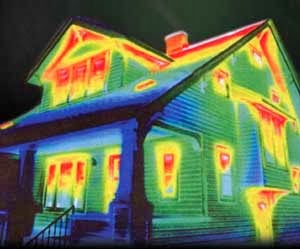 |
| Thermal Imaging shows how energy efficient your home is |
Becoming more energy efficient isn't just for those of us
who want to save the environment. Being energy efficient can really help your
wallet. Maintaining your house is a big investment, and your energy bills can
be among your greatest monthly expenses. When we waste energy in our homes, we
are throwing away money that could be used for other things. But there are many
things you can do in your home that will reduce energy usage. An
energy-efficient home will keep your family comfortable while saving you money.
Whether it's something as big as installing solar panels, or
something as small as turning off the lights, when you cut back on how much
energy you use, you save money. Some energy-efficient changes are one-time
investments...others are things you can do every day! Even if you only
implement two or three of these changes you will be saving energy, money, and
Mother Nature too.
Some steps are simple to take. Others require more effort
and investment, but promise big savings over the years. Those savings will
typically pay for the cost of improvements and put money back in your pocket.
Your home may also be more attractive to buyers when you sell.
HEATING
The majority of us have centrally heated homes and the way
most systems are regulated is by the use of a thermostat. Install a
programmable thermostat to lower utility bills and manage your heating and
cooling systems efficiently. Set the times and temperatures to match your
schedule. By turning down your thermostat just one degree you could save money
on your gas bill and really wouldn’t notice any difference in the warmth of
your home.
Dress warmly when indoors. Lower your thermostat by two
degrees. You could save as much as four percent on your heating bill. Turn off
heat in unused rooms and shut the doors. If you go on vacation for a while, turn
the heat down to save energy. Keep the heat in the house by closing the
curtains. Believe it or not, even this can make a difference. Install a furnace
alarm.
This will tell you when to change filters. Just changing dirty filters
on your furnace could save you five percent on your heating bill. Adding a
humidifier to your heating system lets you turn the thermostat down and be
comfortable at lower temperatures. Aquariums and houseplants add humidity, too.
Change the direction of airflow on your ceiling fan. For
those cold, winter months, the blades should operate in a clockwise direction,
helping to push the warm air from the ceiling down into the room. In the
summer, the blades should operate in a counter clockwise direction as a way of
creating a nice, gentle wind.
Check to see that windows and doors are closed when heating
or cooling your home.
INSULATION
Heat escapes from different parts of a building, rising
through the roof, going through glass windows and even simply radiating through
walls. If you don’t have a well insulated home you will more than likely be
wasting energy through heat loss. Check doors for proper insulation. Place your
hand against a door from the inside. If it feels cooler than the inside walls,
it might be time to install a door that’s better insulated.
Adding new or additional insulation to your ceilings, attic
and walls will prevent cold drafts and air leaks to keep warm air inside during
the freezing winter (or in summer keeps the cool air from A/C inside your
home).
Your windows are a major source of heat loss in a home. Replace
Aluminum Frames. Aluminum window frames let heat transfer very easily. Vinyl
frames are much more resistant to heat transfer. Double or triple paned argon
gas-filled windows are great for keeping the heat in and the cold out. While
you may not think that tinted windows on the front of your house looks very
attractive, you can always do it to the back windows. It's surprising how much
unwanted heat and cold you can keep out by having tinted windows.
Open the blinds and let some sun in. Lighting your house
with sunlight is 100% FREE!
Don’t lose heated air up your chimney! The chimney acts like
an open window. If you never use your fireplace, plug and seal the chimney
flue.
STANDBY
Most people think that standby mode is an energy saving way
to use various types of equipment ranging from TVs to computers. In essence it
does cut down on energy use but standby modes still use power to keep a device
‘ticking over’ so that it is ready for when you want to use it again. It’s just
as easy to simply turn things off when they are not in use.
SHOWERS
Having a shower instead of a bath means you will use on
average about half the amount of water. Not only is water a precious resource
in many parts of the world but heating it adds cost to your energy bills so the
less you use, the more you save. So, take short showers instead of baths and
use low-flow showerheads for additional energy savings. It will pay for itself
in no time.
MAINTENANCE
Having equipment that is working to its maximum levels can
result in more efficient energy usage. A boiler may need Heat Exchange Repair
or radiators may simply need to be bled of excess air occasionally for things
to run at optimal levels.
AIR CONDITIONING
Increase your air conditioner temperature by one degree.
Believe it or not, it could mean significant savings over the long run. When
it’s cool outside, open the windows and turn off the air. If you’re going to be
away from your home for a long time, say, on vacation or a long weekend, turn
the temperature up. Or better yet, turn the air conditioning unit off. Replace
air filters every month. Clogged filters mean your A/C works harder. Buy the
proper-sized equipment to meet your family’s needs. An oversized A/C unit will
waste energy.
HOT WATER
Check your hot water temperature. 140° is sufficient for
washing dishes and clothes. Insulate your water heater and its pipes. Your
water will stay hotter longer. Avoid washing dishes in hot running water. Fill
the sink halfway, and then scrub away. Repair dripping hot water taps
immediately. Air dry dishes instead of using your dishwasher's drying cycle.
LAUNDRY
Wash full loads. You’ll use the machine less, save time and
save energy. Wash at a lower temperature. Use the spin cycle, and then hang dry
your clothes and sheets. Use your dryer for consecutive loads. The built-up
heat means less energy spent. Air dry clothes.
COOKING
Microwaves use substantially less energy than ovens. Use one
when cooking and reheating items.
FRIDGE AND FREEZER
Defrost your fridge regularly. When ice builds up, your
freezer uses more electricity. If it frosts up again quickly, check that the
door seals are strong and intact. Keep your fridge at least three quarters full
for maximum efficiency.
LIGHTNING
Use energy-saving lightbulbs that can last up to ten times
longer than a normal bulb and use significantly less energy. A single 20- to
25-watt energy-saving bulb provides as much light as a 100-watt ordinary bulb.
INSTALL MOTION SENSORS ON EXTERNAL LIGHTS
Use only one bulb for light fittings with more than one
lightbulb or replace additional bulbs with a lower wattage version.
ADD SOLAR PANELS
Adding solar panels to your house can help you cut down on
energy costs by helping you produce a little bit of your own electricity.
When buying or building a new house, you should consider your
energy efficiency options early in the process.
Try these easy, low-cost or no-cost energy saving tips and see how easy it is to save energy and money. Having an energy efficient home may also be more attractive to buyers when you sell.
Try these easy, low-cost or no-cost energy saving tips and see how easy it is to save energy and money. Having an energy efficient home may also be more attractive to buyers when you sell.
If you are thinking about selling your property now or in the near future, please contact me for a free consultation. I can provide you with exceptional services and market your home, condo or commercial building to its fullest potential. I have been selling both residential and commercial real estate in Durham Region for over 20 years. So contact me today!
Randy Miller
Sales Representative
Re/Max Rouge River Realty Ltd., Brokerage
905-668-1800 or 905-427-1400
randy@randymiller.ca
www.randymiller.ca





















